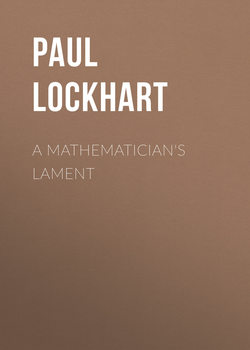Читать книгу A Mathematician's Lament - Paul Lockhart - Страница 9
На сайте Литреса книга снята с продажи.
ОглавлениеMathematics in School
THERE IS SURELY NO MORE RELIABLE WAY TO KILL enthusiasm and interest in a subject than to make it a mandatory part of the school curriculum. Include it as a major component of standardized testing and you virtually guarantee that the education establishment will suck the life out of it. School boards do not understand what math is; neither do educators, textbook authors, publishing companies, and, sadly, neither do most of our math teachers. The scope of the problem is so enormous I hardly know where to begin.
Let’s start with the “math reform” debacle. For many years there has been a growing awareness that something is rotten in the state of mathematics education. Studies have been commissioned, conferences assembled, and countless committees of teachers, textbook publishers, and educators (whatever they are) have been formed to “fix the problem.” Quite apart from the self-serving interest paid to reform by the textbook industry (which profits from any minute political fluctuation by offering up “new” editions of their unreadable monstrosities), the entire reform movement has always missed the point. The mathematics curriculum doesn’t need to be reformed, it needs to be scrapped.
All this fussing and primping about which “topics” should be taught in what order, or the use of this notation instead of that notation, or which make and model of calculator to use, for god’s sake —it’s like rearranging the deck chairs on the Titanic! Mathematics is the music of reason. To do mathematics is to engage in an act of discovery and conjecture, intuition and inspiration; to be in a state of confusion—not because it makes no sense to you, but because you gave it sense and you still don’t understand what your creation is up to; to have a breakthrough idea; to be frustrated as an artist; to be awed and overwhelmed by an almost painful beauty; to be alive, damn it. Remove this from mathematics and you can have all the conferences you like; it won’t matter. Operate all you want, doctors: your patient is already dead.
The saddest part of all this “reform” are the attempts to “make math interesting” and “relevant to kids’ lives.” You don’t need to make math interesting—it’s already more interesting than we can handle! And the glory of it is its complete irrelevance to our lives. That’s why it’s so fun!
Attempts to present mathematics as relevant to daily life inevitably appear forced and contrived: “You see, kids, if you know algebra then you can figure out how old Maria is if we know that she is two years older than twice her age seven years ago!” (As if anyone would ever have access to that ridiculous kind of information, and not her age.) Algebra is not about daily life, it’s about numbers and symmetry—and this is a valid pursuit in and of itself:
Suppose I am given the sum and difference of two numbers. How can I figure out what the numbers are themselves?
Here is a simple and elegant question, and it requires no effort to be made appealing. The ancient Babylonians enjoyed working on such problems, and so do our students. (And I hope you will enjoy thinking about it too!) We don’t need to bend over backwards to give mathematics relevance. It has relevance in the same way that any art does: that of being a meaningful human experience.
In any case, do you really think kids even want something that is relevant to their daily lives? You think something practical like compound interest is going to get them excited? People enjoy fantasy, and that is just what mathematics can provide—a relief from daily life, an anodyne to the practical workaday world.
A similar problem occurs when teachers or textbooks succumb to cutesiness. This is where, in an attempt to combat so-called “math anxiety” (one of the panoply of diseases which are actually caused by school), math is made to seem “friendly.” To help your students memorize formulas for the area and circumference of a circle, for example, you might invent a whole story about Mr. C, who drives around Mrs. A and tells her how nice his two pies are (C
